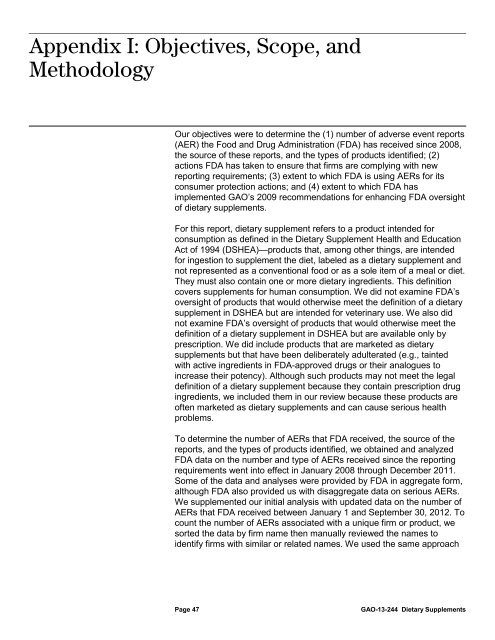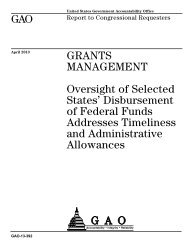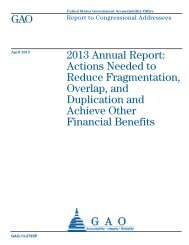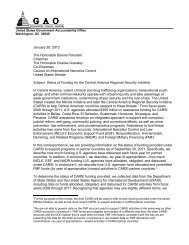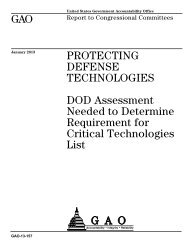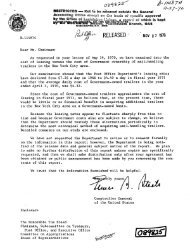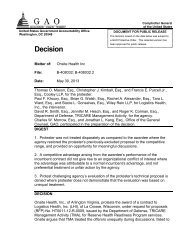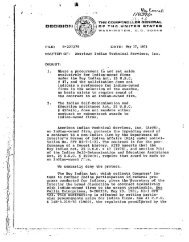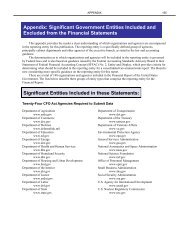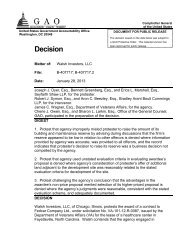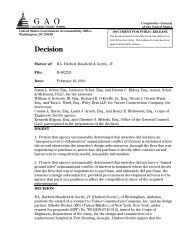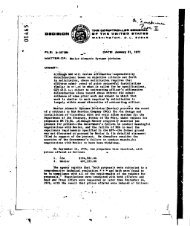Dietary supplements: FDA may have opportunities to expand its use
Dietary supplements: FDA may have opportunities to expand its use
Dietary supplements: FDA may have opportunities to expand its use
You also want an ePaper? Increase the reach of your titles
YUMPU automatically turns print PDFs into web optimized ePapers that Google loves.
Appendix I: Scope, and<br />
Appendix I: Objectives, Scope, and<br />
Methodology<br />
Methodology<br />
Our objectives were <strong>to</strong> determine the (1) number of adverse event reports<br />
(AER) the Food and Drug Administration (<strong>FDA</strong>) has received since 2008,<br />
the source of these reports, and the types of products identified; (2)<br />
actions <strong>FDA</strong> has taken <strong>to</strong> ensure that firms are complying with new<br />
reporting requirements; (3) extent <strong>to</strong> which <strong>FDA</strong> is using AERs for <strong>its</strong><br />
consumer protection actions; and (4) extent <strong>to</strong> which <strong>FDA</strong> has<br />
implemented GAO’s 2009 recommendations for enhancing <strong>FDA</strong> oversight<br />
of dietary <strong>supplements</strong>.<br />
For this report, dietary supplement refers <strong>to</strong> a product intended for<br />
consumption as defined in the <strong>Dietary</strong> Supplement Health and Education<br />
Act of 1994 (DSHEA)—products that, among other things, are intended<br />
for ingestion <strong>to</strong> supplement the diet, labeled as a dietary supplement and<br />
not represented as a conventional food or as a sole item of a meal or diet.<br />
They must also contain one or more dietary ingredients. This definition<br />
covers <strong>supplements</strong> for human consumption. We did not examine <strong>FDA</strong>’s<br />
oversight of products that would otherwise meet the definition of a dietary<br />
supplement in DSHEA but are intended for veterinary <strong>use</strong>. We also did<br />
not examine <strong>FDA</strong>’s oversight of products that would otherwise meet the<br />
definition of a dietary supplement in DSHEA but are available only by<br />
prescription. We did include products that are marketed as dietary<br />
<strong>supplements</strong> but that <strong>have</strong> been deliberately adulterated (e.g., tainted<br />
with active ingredients in <strong>FDA</strong>-approved drugs or their analogues <strong>to</strong><br />
increase their potency). Although such products <strong>may</strong> not meet the legal<br />
definition of a dietary supplement beca<strong>use</strong> they contain prescription drug<br />
ingredients, we included them in our review beca<strong>use</strong> these products are<br />
often marketed as dietary <strong>supplements</strong> and can ca<strong>use</strong> serious health<br />
problems.<br />
To determine the number of AERs that <strong>FDA</strong> received, the source of the<br />
reports, and the types of products identified, we obtained and analyzed<br />
<strong>FDA</strong> data on the number and type of AERs received since the reporting<br />
requirements went in<strong>to</strong> effect in January 2008 through December 2011.<br />
Some of the data and analyses were provided by <strong>FDA</strong> in aggregate form,<br />
although <strong>FDA</strong> also provided us with disaggregate data on serious AERs.<br />
We supplemented our initial analysis with updated data on the number of<br />
AERs that <strong>FDA</strong> received between January 1 and September 30, 2012. To<br />
count the number of AERs associated with a unique firm or product, we<br />
sorted the data by firm name then manually reviewed the names <strong>to</strong><br />
identify firms with similar or related names. We <strong>use</strong>d the same approach<br />
Page 47<br />
GAO-13-244 <strong>Dietary</strong> Supplements


